There are signs of a return to something worryingly close to the hardline restrictions of the past across Afghan life
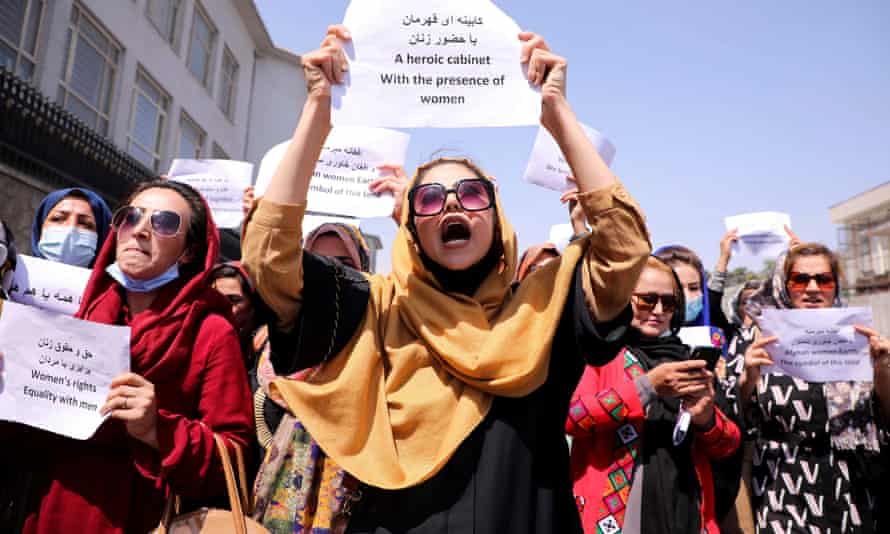
Afghan women protest to demand the preservation of their rights in front of the presidential palace in Kabul on Friday. Photograph: Reuters
Emma Graham-Harrison in Kabul and Akhtar Mohammad Makoii
Fri 3 Sep 2021
When Taliban fighters moved into Herat city in western Afghanistan last month, one thing mattered more to some of them than the battle itself. As gunmen faced off around the governor’s office, a group of militants came to Shogofa’s* workplace and ordered all the women home.
“They hadn’t even taken all the city, but they came to our headquarters. The manager called an emergency meeting and they told all the women to leave,” she said.
As the main breadwinner for her widowed mother and disabled brother, losing her job means destitution. So on Thursday she decided to publicly challenge Afghanistan’s new rulers. With about 40 or 50 other women, she walked to the seat of city government chanting: “No fear, we are united.”
“We hoped we could tell the governor how we are struggling, but they let us stand there for some time then removed us – we couldn’t even meet him,” she said.
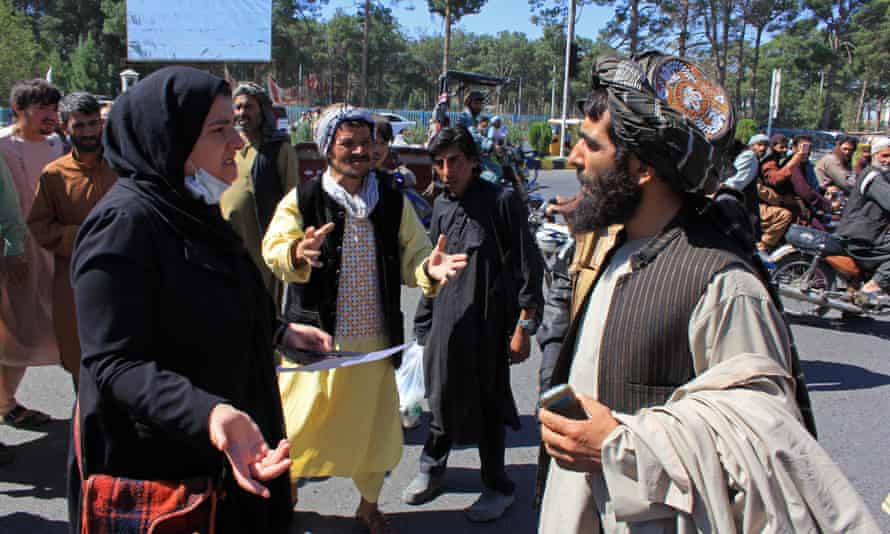
Emma Graham-Harrison in Kabul and Akhtar Mohammad Makoii
Fri 3 Sep 2021
When Taliban fighters moved into Herat city in western Afghanistan last month, one thing mattered more to some of them than the battle itself. As gunmen faced off around the governor’s office, a group of militants came to Shogofa’s* workplace and ordered all the women home.
“They hadn’t even taken all the city, but they came to our headquarters. The manager called an emergency meeting and they told all the women to leave,” she said.
As the main breadwinner for her widowed mother and disabled brother, losing her job means destitution. So on Thursday she decided to publicly challenge Afghanistan’s new rulers. With about 40 or 50 other women, she walked to the seat of city government chanting: “No fear, we are united.”
“We hoped we could tell the governor how we are struggling, but they let us stand there for some time then removed us – we couldn’t even meet him,” she said.

An Afghan woman speaks with a member of the Taliban during a protest in Herat on Thursday. Photograph: AFP/Getty Images
Since seizing Afghanistan, Taliban spokesmen and high officials have promised to respect women’s rights to work and education, albeit within an Islamic framework they refuse to define.
These pledges have prompted an international discussion about how much the Taliban have changed since they ruled the country with extreme and oppressive misogyny in the 1990s, barring women from almost all work and education.
There have been calls from abroad to give the group time to form a government and lay out its policy before pressing too hard on women’s rights. But there is increasing evidence from across Afghanistan that the biggest changes may be in messaging, rather than ideology.
Women protesting in Herat had been stripped of their jobs two weeks ago; reports from elsewhere include gunmen ordering bank tellers out of their jobs in Kandahar.
Since seizing Afghanistan, Taliban spokesmen and high officials have promised to respect women’s rights to work and education, albeit within an Islamic framework they refuse to define.
These pledges have prompted an international discussion about how much the Taliban have changed since they ruled the country with extreme and oppressive misogyny in the 1990s, barring women from almost all work and education.
There have been calls from abroad to give the group time to form a government and lay out its policy before pressing too hard on women’s rights. But there is increasing evidence from across Afghanistan that the biggest changes may be in messaging, rather than ideology.
Women protesting in Herat had been stripped of their jobs two weeks ago; reports from elsewhere include gunmen ordering bank tellers out of their jobs in Kandahar.
01:15 Women's rights will be respected 'within the limits of Islam', say Taliban – video
The Taliban have already asked most women to stay home, claiming it is a temporary measure for “security reasons”, but that explanation has an ominous ring to Afghan women whose memories stretch back to the last time the group held power.
“We heard some of these explanations in 1996 to 2001, when the Taliban said that the reason girls couldn’t study and women couldn’t work was because the security situation wasn’t good, and once the security situation was better they could go back. Of course that moment never arrived,” said Heather Barr, associate director of the women’s rights division at Human Rights Watch.
“This indicates that even in the 1990s the Taliban felt the need to disguise some of their misogyny. So this is not an entirely new communications strategy they are pursuing now and Afghan women can see that.”
Other crippling rules from that period that have resurfaced unofficially, according to accounts from Afghan women, include a requirement for a male guardian, or mahram, to accompany them in any public space.

An Afghan man sells Taliban flags in Kabul on Friday. Photograph: EPA
Bano, another protester in Herat, works in healthcare, one sector where the Taliban have specifically called on women to come back to their jobs, but says she was ordered home for commuting alone.
Her husband, a soldier, has been missing in action for three years and with no adult sons or brothers nearby, she has no one to fill this role. “They said I should stay at home because I don’t have a mahram to accompany me to the entrance of the clinic,” she told the Guardian by phone.
She has been the sole breadwinner for three children since her husband went missing and she is getting desperate. “I am borrowing money from my friends and relatives in the city. We cannot go on like this.”
The women said they spoke for many others facing similar crises, but who were too frightened to come out on Taliban-controlled streets.
“We were there as their representatives, many of them sent us messages and shared our protest on social media,” said Shogofa. “We wanted to tell the world Afghan women are really struggling.”
In education, too, there are clear signs women will face extensive and damaging exclusion, even if restrictions do not go as far as the total ban of the 1990s.
Bano, another protester in Herat, works in healthcare, one sector where the Taliban have specifically called on women to come back to their jobs, but says she was ordered home for commuting alone.
Her husband, a soldier, has been missing in action for three years and with no adult sons or brothers nearby, she has no one to fill this role. “They said I should stay at home because I don’t have a mahram to accompany me to the entrance of the clinic,” she told the Guardian by phone.
She has been the sole breadwinner for three children since her husband went missing and she is getting desperate. “I am borrowing money from my friends and relatives in the city. We cannot go on like this.”
The women said they spoke for many others facing similar crises, but who were too frightened to come out on Taliban-controlled streets.
“We were there as their representatives, many of them sent us messages and shared our protest on social media,” said Shogofa. “We wanted to tell the world Afghan women are really struggling.”
In education, too, there are clear signs women will face extensive and damaging exclusion, even if restrictions do not go as far as the total ban of the 1990s.
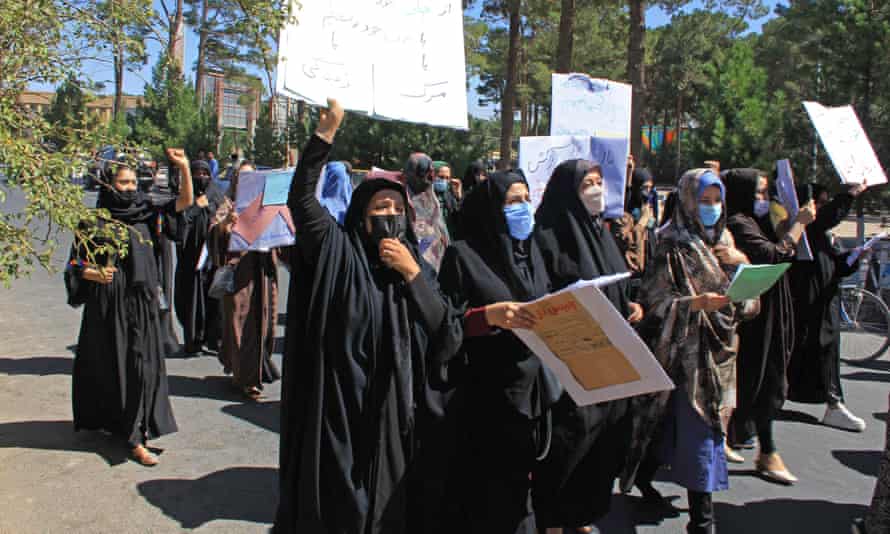
Afghan women hold placards at protest in Herat. Photograph: AFP/Getty Images
The new higher education minister has said women and men must be separated at universities, and the historical consequences of services promoted as “separate but equal” within a discriminatory system strongly suggest that women will be pushed out or get a lower quality education.
A labyrinthine new decree to private universities, seen by the Guardian, lays out a long list of prescriptive, and likely expensive, rules to prevent male and female students even glimpsing each other’s faces during years of study.
Women must be provided with transport in buses with covered windows and a curtain separating them from the presumably male driver. They must be confined to a “waiting room” before and between classes, and the decree even details a required clothing colour for female students and teachers (black).
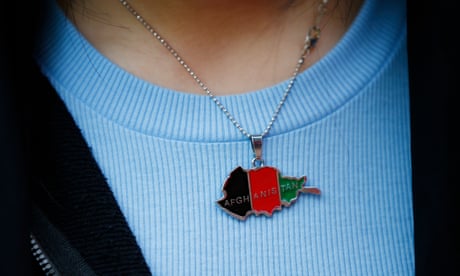
‘My homeland, my only love’: fleeing Afghans embrace 1998 song
All new classes must be segregated, and in current classes with under 15 women, a “sharia partition” must be erected to keep students of different gender apart. Ideally, teachers will also be separated by gender, the new rules say. “In the future, all universities should provide female teachers for women’s classes. They should also try to use older teachers with a good background,” the letter said.
Education officials were told in a meeting that women could never teach male students, although men might be able to teach women if there were no female lecturers available, a source told the Guardian.
Some women say they have already given up on their education, over fear of the Taliban’s new rules and their brutal past. “I don’t believe the Taliban. I’m scared of their rules and I’m concerned to lose my life for no reason under their control,” said one student, who lived in a hostel while studying in Kabul; she no longer thinks the Taliban will allow that.
“I had a plan to accelerate my studies and take more classes. I went to the gym after university. I had a plan to launch a small business for myself in Kabul, but everything vanished in a matter of hours. Words cannot describe my current depression.”
There are signs of a return to something worryingly close to the hardline restrictions of the past across other areas of Afghan life. Beauty salons have been ordered to paint over images of women and the Taliban have announced a ban on music, although it is not clear how strictly they plan to implement it.
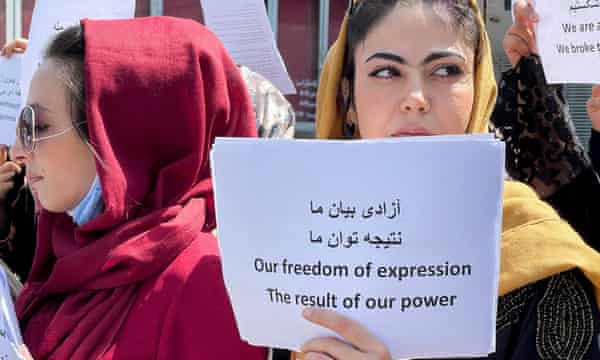 Protesters in Kabul. Photograph: Reuters
Protesters in Kabul. Photograph: Reuters
Yet despite the gathering repression and the Taliban’s track record of brutality, Afghan women say they are determined to fight on. Women in Kabul came out to protest on Friday, inspired in part, one said, by the demonstrations in Herat.
They called for a role in government, after the Taliban ruled out any woman holding a cabinet level position. The Taliban fighters ripped up placards and attacked a male ally, but the women still plan to come out again, according to Fatima, a small-business manager who has been too afraid to open since the Taliban takeover.
“We have been through war, and conflict too, why should we be removed entirely from politics?”
*All names have been changed in this article to protect the women.
Additional reporting by Mursal Rasa.
The new higher education minister has said women and men must be separated at universities, and the historical consequences of services promoted as “separate but equal” within a discriminatory system strongly suggest that women will be pushed out or get a lower quality education.
A labyrinthine new decree to private universities, seen by the Guardian, lays out a long list of prescriptive, and likely expensive, rules to prevent male and female students even glimpsing each other’s faces during years of study.
Women must be provided with transport in buses with covered windows and a curtain separating them from the presumably male driver. They must be confined to a “waiting room” before and between classes, and the decree even details a required clothing colour for female students and teachers (black).

‘My homeland, my only love’: fleeing Afghans embrace 1998 song
All new classes must be segregated, and in current classes with under 15 women, a “sharia partition” must be erected to keep students of different gender apart. Ideally, teachers will also be separated by gender, the new rules say. “In the future, all universities should provide female teachers for women’s classes. They should also try to use older teachers with a good background,” the letter said.
Education officials were told in a meeting that women could never teach male students, although men might be able to teach women if there were no female lecturers available, a source told the Guardian.
Some women say they have already given up on their education, over fear of the Taliban’s new rules and their brutal past. “I don’t believe the Taliban. I’m scared of their rules and I’m concerned to lose my life for no reason under their control,” said one student, who lived in a hostel while studying in Kabul; she no longer thinks the Taliban will allow that.
“I had a plan to accelerate my studies and take more classes. I went to the gym after university. I had a plan to launch a small business for myself in Kabul, but everything vanished in a matter of hours. Words cannot describe my current depression.”
There are signs of a return to something worryingly close to the hardline restrictions of the past across other areas of Afghan life. Beauty salons have been ordered to paint over images of women and the Taliban have announced a ban on music, although it is not clear how strictly they plan to implement it.
 Protesters in Kabul. Photograph: Reuters
Protesters in Kabul. Photograph: ReutersYet despite the gathering repression and the Taliban’s track record of brutality, Afghan women say they are determined to fight on. Women in Kabul came out to protest on Friday, inspired in part, one said, by the demonstrations in Herat.
They called for a role in government, after the Taliban ruled out any woman holding a cabinet level position. The Taliban fighters ripped up placards and attacked a male ally, but the women still plan to come out again, according to Fatima, a small-business manager who has been too afraid to open since the Taliban takeover.
“We have been through war, and conflict too, why should we be removed entirely from politics?”
*All names have been changed in this article to protect the women.
Additional reporting by Mursal Rasa.
No comments:
Post a Comment